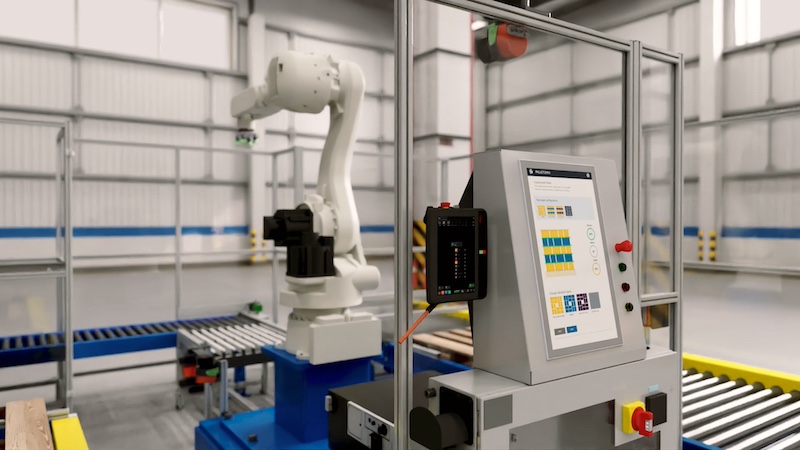
Toyota partners with Ready Robotics on robotic programming
Ready Robotics, a provider of operating systems for automation and robotics, is collaborating with Toyota Motor Corporation and Nvidia to bring a “significant leap forward” in industrial robotics.
Toyota will employ Ready ForgeOS in tandem with Nvidia Isaac Sim, a robotics simulator developed on Nvidia Omniverse, to build a “state-of-the-art simulated robotic programming environment” for its aluminum hot forging production lines.
This groundbreaking collaboration is set to enhance safety and efficiency in Toyota’s manufacturing processes.
Typically, programming robotic systems for forging necessitates that the metal parts remain hot during programming, presenting significant safety challenges.
With the integration of ForgeOS and Nvidia Isaac Sim — an extensible application developed on the Omniverse platform for simulating, developing, and testing robots — programming can now be accomplished seamlessly in a simulated environment, eliminating the risks associated with hot parts.
Ready Robotics is the developer of ForgeOS, the industrial OS for robots and automation, and a pioneer in time-saving automation solutions that overcome the obstacles faced by manufacturers.
ForgeOS simplifies the programming process, reducing the typical complexities of robotic systems and enabling an easy-to-use experience for any industrial robotic manipulator.
Ready has integrated ForgeOS with Nvidia Isaac Sim to provide best-in-class visual and physics-simulation fidelity, bringing unprecedented realism to robotic simulations.
With ForgeOS’ intuitive programming and Nvidia’s realistic simulation environments, Toyota can quickly program and optimize complex robotic hot forging routines in simulations that capture the nuance of the complex hot forging processes.
Once proven in the simulated environment, these programs can be seamlessly transferred into the live production work cell, removing the necessity for programming in the physical installation itself, thereby reducing the concern for safety around hot parts.
Since ForgeOS controls both the simulation and physical work cell, the program can be transferred and updated in seconds, minimizing downtime and making the work cell easier to maintain.
Another novel aspect of this “sim-to-real” workflow is ForgeOS’ ability to relay real-time production data from the cell on the factory floor back to the original Nvidia Isaac Sim simulation. This forms a digital twin of the live cell, enabling visualizations of its current state and facilitating greater monitoring and oversight.
The combination of ForgeOS and Nvidia Isaac Sim enables the rapid creation of realistic programs for challenging programming tasks, especially those where safety is a concern.
Dr Kel Guerin, CIO at Ready Robotics, says: “Nvidia provides the tools needed to help our programs reflect real-world situations, and ForgeOS provides the connection from this simulation to the real cell and back.
“We are pleased to be working with SCSK, a leading Japanese IT services company and Nvidia Omniverse partner, to bring this solution to Toyota.”
Kazuhiro Suzuki, group manager of Toyota Motor Corporation’s raw materials development division, says: “The unique architecture of ForgeOS allows for the sim-to-real workflow we need for this production line because it bridges Nvidia Isaac Sim’s simulation capabilities with the control of our physical system.
“This means we can program in simulation, transfer that program, and then use ForgeOS to capture live production data and iteratively improve our processes.”
Toyota’s collaboration with Ready Robotics and Nvidia is poised to create a new frontier for how robotic automation is programmed and deployed with greater efficiency, usability, and safety, and it opens the opportunity for production data to be captured from automation systems for use in process monitoring and improvement, or even artificial intelligence applications.
Suzuki says: “We are looking towards a future where machine learning and AI allow for advancements in our manufacturing processes, but everything starts with improving our current processes, all while simultaneously extracting the data out of the factory into simulation where it is useful.”
Deepu Talla, vice president of embedded and edge computing at Nvidia, says: “Simulating industrial processes in high fidelity prior to their real-world deployment can greatly improve productivity and safety while reducing costs.
“The collaboration between Toyota and Ready Robotics is a great example of the pioneering use of technology, such as Nvidia Isaac Sim, to unlock industrial digitalization possibilities in manufacturing.”

